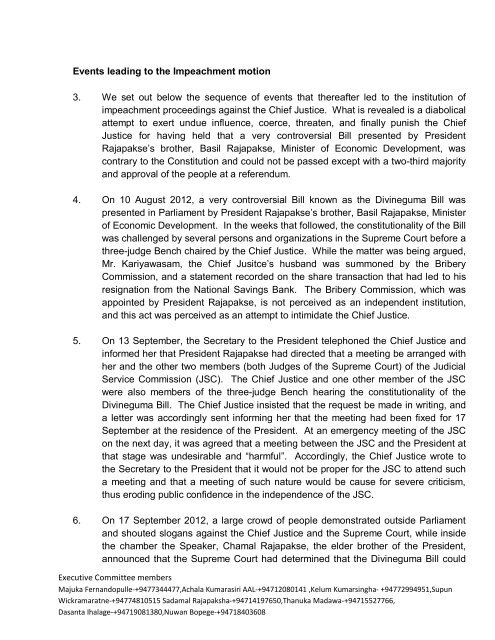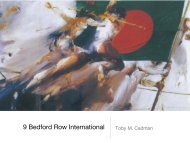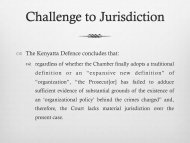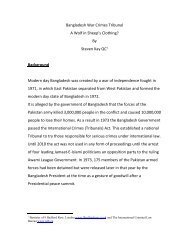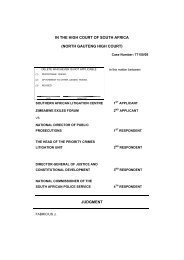Letter dated 14 December 2012 - The International Criminal Law ...
Letter dated 14 December 2012 - The International Criminal Law ...
Letter dated 14 December 2012 - The International Criminal Law ...
You also want an ePaper? Increase the reach of your titles
YUMPU automatically turns print PDFs into web optimized ePapers that Google loves.
Events leading to the Impeachment motion<br />
3. We set out below the sequence of events that thereafter led to the institution of<br />
impeachment proceedings against the Chief Justice. What is revealed is a diabolical<br />
attempt to exert undue influence, coerce, threaten, and finally punish the Chief<br />
Justice for having held that a very controversial Bill presented by President<br />
Rajapakse’s brother, Basil Rajapakse, Minister of Economic Development, was<br />
contrary to the Constitution and could not be passed except with a two-third majority<br />
and approval of the people at a referendum.<br />
4. On 10 August <strong>2012</strong>, a very controversial Bill known as the Divineguma Bill was<br />
presented in Parliament by President Rajapakse’s brother, Basil Rajapakse, Minister<br />
of Economic Development. In the weeks that followed, the constitutionality of the Bill<br />
was challenged by several persons and organizations in the Supreme Court before a<br />
three-judge Bench chaired by the Chief Justice. While the matter was being argued,<br />
Mr. Kariyawasam, the Chief Jusitce’s husband was summoned by the Bribery<br />
Commission, and a statement recorded on the share transaction that had led to his<br />
resignation from the National Savings Bank. <strong>The</strong> Bribery Commission, which was<br />
appointed by President Rajapakse, is not perceived as an independent institution,<br />
and this act was perceived as an attempt to intimidate the Chief Justice.<br />
5. On 13 September, the Secretary to the President telephoned the Chief Justice and<br />
informed her that President Rajapakse had directed that a meeting be arranged with<br />
her and the other two members (both Judges of the Supreme Court) of the Judicial<br />
Service Commission (JSC). <strong>The</strong> Chief Justice and one other member of the JSC<br />
were also members of the three-judge Bench hearing the constitutionality of the<br />
Divineguma Bill. <strong>The</strong> Chief Justice insisted that the request be made in writing, and<br />
a letter was accordingly sent informing her that the meeting had been fixed for 17<br />
September at the residence of the President. At an emergency meeting of the JSC<br />
on the next day, it was agreed that a meeting between the JSC and the President at<br />
that stage was undesirable and “harmful”. Accordingly, the Chief Justice wrote to<br />
the Secretary to the President that it would not be proper for the JSC to attend such<br />
a meeting and that a meeting of such nature would be cause for severe criticism,<br />
thus eroding public confidence in the independence of the JSC.<br />
6. On 17 September <strong>2012</strong>, a large crowd of people demonstrated outside Parliament<br />
and shouted slogans against the Chief Justice and the Supreme Court, while inside<br />
the chamber the Speaker, Chamal Rajapakse, the elder brother of the President,<br />
announced that the Supreme Court had determined that the Divineguma Bill could<br />
Executive Committee members<br />
Majuka Fernandopulle-+9477344477,Achala Kumarasiri AAL-+94712080<strong>14</strong>1 ,Kelum Kumarsingha- +94772994951,Supun<br />
Wickramaratne-+94774810515 Sadamal Rajapaksha-+947<strong>14</strong>197650,Thanuka Madawa-+94715527766,<br />
Dasanta Ihalage-+94719081380,Nuwan Bopege-+94718403608


